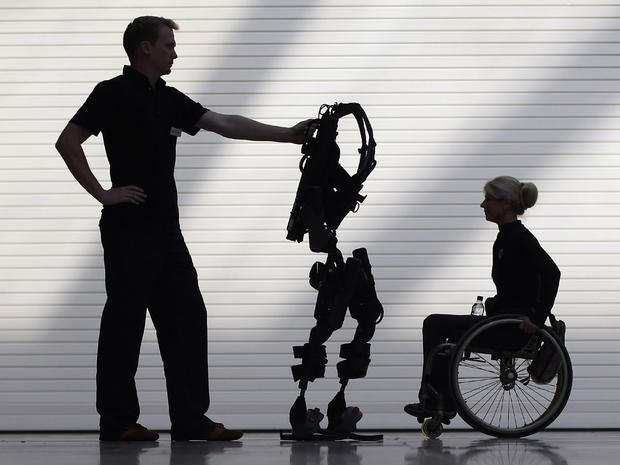Prosthetic exoskeleton helps paraplegics walk again at U.S. rehab centers
(CBS News) Patients with spinal cord and other mobility-inhibiting injuries have a new hope in the form of Ekso, a commercially-available prosthetic exoskeleton that's already been distributed to some of the premier rehab centers around the country.
PICTURES: Rob's miracle: Paralyzed man's first steps
VIDEO: Paralyzed woman walks with exoskeleton
Essentially, Ekso is a ready-to-wear robotic prosthesis that functions as a second pair of legs. With the help of a trained therapist, patients are strapped in and can begin sessions immediately. Motors rest on each hip, which are powered by a lithium ion battery that lasts up to three hours. Also, over 30 sensors that work together on the device to enable life-like walking. If the left crutch is moved forward, the on-board commuter knows to move the right leg and vice-versa.
Developed by California-based Ekso Bionics, preliminary trials of Ekso took place over the course of ten months and produced promising results. A total of sixty-three paraplegia-afflicted patients participated in the initial program, which began in 2010. All of them regained a degree of mobility with the apparatus. In their first session alone, the users were able to walk between 81 and 638 steps. On average, the total steps taken exceeded 200.
Michael Rhode, a C6/7 quadriplegic at the Kessler Institute, called the experience "one of the most unbelievable feelings I've ever had. I just started walking." Michael took 520 steps during his first session in Ekso in February.
Now it's being rolled out to rehab centers around the U.S. Earlier in April, Good Shephard Penn Partners became the first rehab facility in the Philadelphia region to offer the new technology, CBS Philly reported. Six patients gained early access to the treatment.
Across the country, Craig Hospital in Englewood Colo. unveiled the Ekso device, CBS Denver reported. One patient James Nall, who had been paralyzed 18 months earlier falling down the stairs, took steps with the help of the battery-powered device.
"It's just kind of like re-training your body and this is definitely one thing that is highly beneficial to that," Nall said.
Ekso's $130,000 price tag, which includes training, makes it one of the most commercially viable exoskeletons of its type ever developed. As of now, the number of patients using Ekso has increased to nearly 250. The company has also established Ekso Hope to help interested facilities raise funds for the device.
In the future, more exoskeleton-based walking units are likely to hit the commercial market. Notably, Israeli company Argo Medical Technologies is developing a unit called ReWalk, which requires no therapist support. Ekso Bionics also hopes to introduce a version for individuals to use on their own without supervision by 2014.
Here's a video of the Ekso in action from CBS Denver:
Katie Linendoll is the tech host of All Access Weekly on Spike TV. She can also be seen regularly contributing her tech expertise on CNN. She has a degree in IT New Media from the Rochester Institute of Technology.
